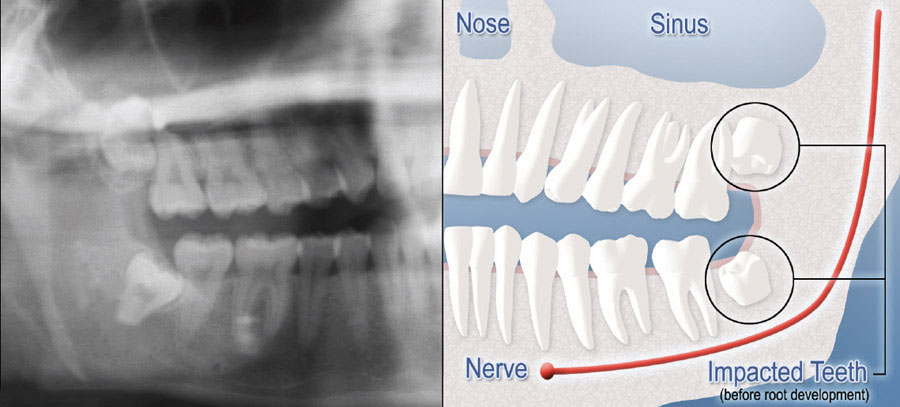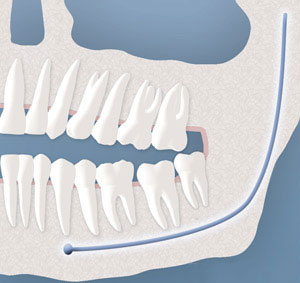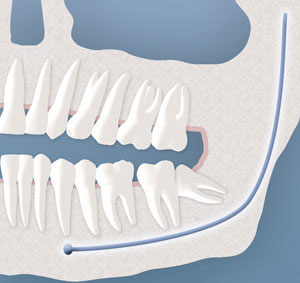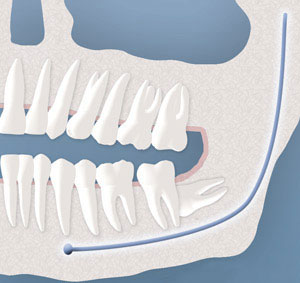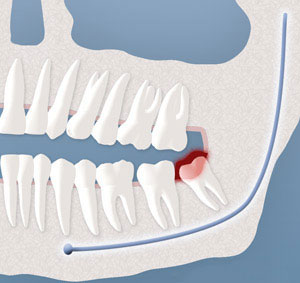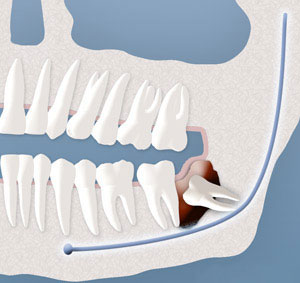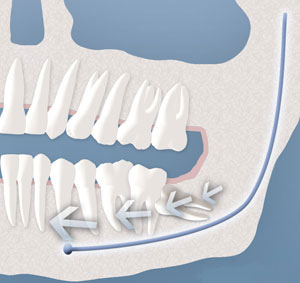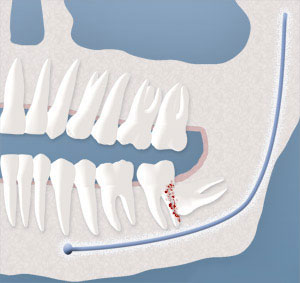What Are Wisdom Teeth?
Third molars are commonly referred to as wisdom teeth.
They are usually the last teeth to develop and are located in the back of your mouth, behind your second molars.
Their development is usually completed between the middle teenage years and early twenties, a time traditionally associated with the onset of maturity and the attainment of wisdom.
What Is An Impacted Tooth?
Although most people develop and grow 32 permanent adult teeth, many times their jaws are too small to accommodate the four wisdom teeth.
When inadequate space prevents the teeth from erupting they are called impacted. This indicates their inability to erupt into the proper position for chewing and cleaning.
Types Of Impactions
We will need to see you for a consultation to determine if you will benefit from wisdom tooth removal.
A special x-ray of your mouth and jaws (panorex) will be taken to determine if your wisdom teeth are impacted, if there is room for them to erupt, and how difficult it will be to have them removed.
Soft Tissue Impaction: There is not enough room to allow the gum tissue to retract for adequate cleaning of the tooth.
Partial Bony Impaction: There is enough space to allow the wisdom tooth to partially erupt. However, the tooth cannot function properly in the chewing process, and creates cleaning problems, among others.
Complete Bony Impaction: There is NO space for the tooth to erupt. It remains embedded in the jaw bone or if even partially visible requires complex surgical techniques for removal.The impacted wisdom tooth may also be in an unusual position and difficult to remove. This situation can also arise when the shape or size of the jaw bone and other facial structures make removal of this tooth significantly more complex.
Oral Examination
Our doctors will assess your wisdom teeth using an oral exam and x-rays to spot current or future issues. Early evaluation, usually in your mid-teens, leads to better outcomes. All surgeries are performed with appropriate anesthesia to ensure your comfort and safety.
Why Remove Wisdom Teeth?
If there isn’t enough space for your wisdom teeth to come in, several problems can develop. Removal is often recommended before the roots are fully formed, usually between ages 12 and early 20s. Problems become more common after age 30. Risks of keeping wisdom teeth include:
What If I Don’t Have My Wisdom Teeth Removed As A Teenager Or Young Adult?
Removing wisdom txeeth is easier and safer when you’re younger. As you age, surgery and recovery can be more difficult, with higher risks of complications and slower healing. If your wisdom teeth are fully impacted and not causing problems, your surgeon may advise waiting until an issue arises.
What Happens On The Day Wisdom Teeth Are Removed?
Most patients choose sedation for comfort. Anesthesia options will be discussed at your consultation.
Don’t eat or drink for at least 6 hours before surgery (except for prescription meds with a sip of water).
Bring a responsible adult to drive you home and stay with you after the procedure.
The procedure lasts about 30–60 minutes; expect to be at the office for about 90 minutes.
Dissolvable stitches are usually used if needed.
Start with clear liquids after surgery, then slowly return to normal foods as tolerated.
Avoid dairy products on the day of surgery to prevent nausea.
Pain is usually managed with ibuprofen; stronger medication may be prescribed if needed.
If you’re on birth control pills and are prescribed antibiotics, use alternative contraception.
In the day of treatment, be sure to have an adult with you at the time of removal. Make plans to have a parent or responsible adult stay with you for the rest of the day, following wisdom tooth removal.
Please do not eat or drink anything prior to your surgery. Having anything in your stomach can increase the risk for serious anesthetic complications.
In the day of treatment, be sure to have an adult with you at the time of removal. Make plans to have a parent or responsible adult stay with you for the rest of the day, following wisdom tooth removal.
Please do not eat or drink anything prior to your surgery. Having anything in your stomach can increase the risk for serious anesthetic complications.
Cost and Insurance
The cost depends on the complexity of the removal and anesthesia type. Your surgeon will provide an estimate after reviewing your case. Insurance coverage varies; our staff will help you maximize your benefits.

